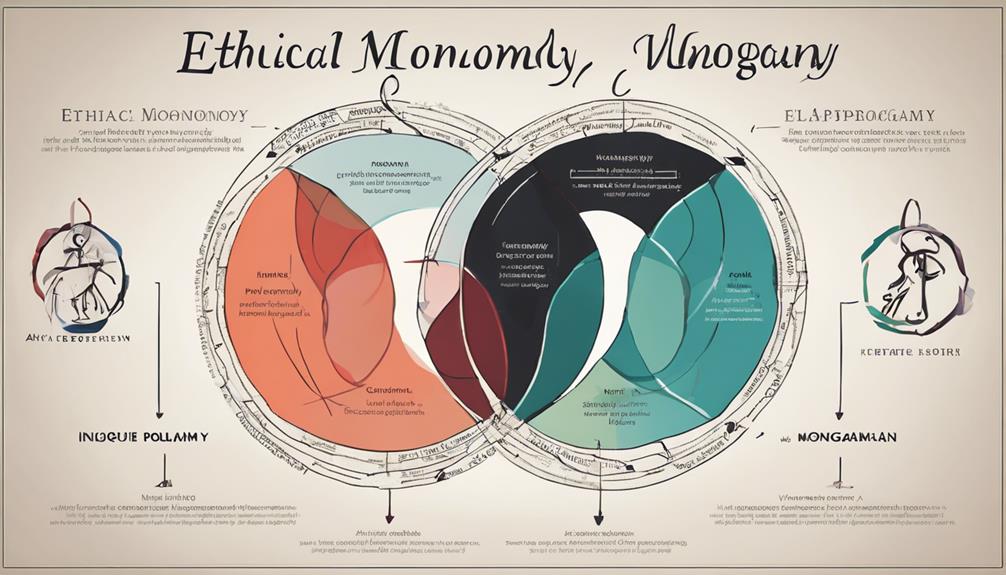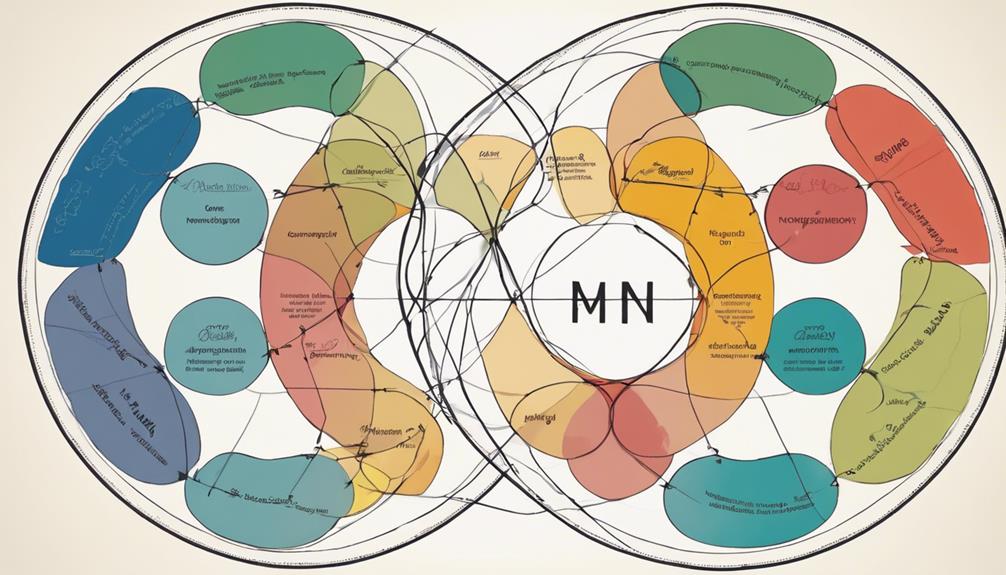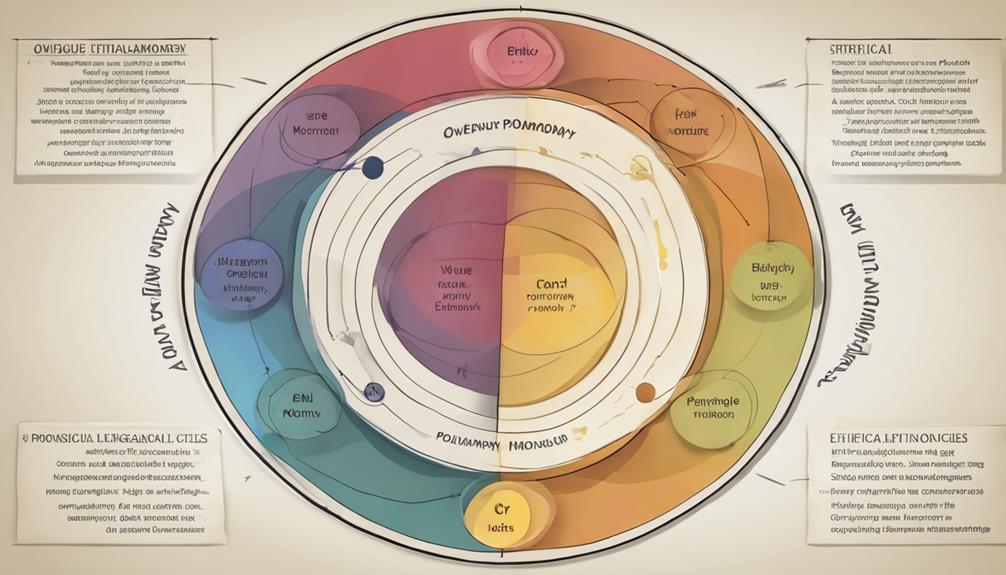When we examine the differences between polyamory and ethical non-monogamy, we discover a subtle interaction of relationship dynamics that surpass traditional norms.
As we decipher the intricate distinctions between these two relationship structures, we begin to unravel the complexities that shape modern love and intimacy.
The intricacies of navigating multiple connections and the ethical considerations involved in non-monogamous relationships draw us into a thought-provoking exploration of the diverse ways individuals choose to engage in intimate partnerships.
Key Takeaways
- Polyamory focuses on romantic love with multiple partners.
- Ethical non-monogamy includes diverse relationship structures.
- Both emphasize trust, honesty, and respect in relationships.
- Understanding distinctions helps navigate preferences and establish clear boundaries effectively.
Defining Polyamory and Ethical Non-Monogamy
In understanding the dynamics of non-monogamous relationships, it's essential to first define polyamory and ethical non-monogamy as distinct but related concepts. Polyamory involves individuals forming multiple romantic connections with the consent and knowledge of all parties involved. This emphasizes the importance of communication, consent, respect, and setting clear boundaries to ensure that all individuals in these relationships feel valued and heard.
Ethical non-monogamy, on the other hand, is a broader term that encompasses various relationship structures beyond just polyamory. It includes practices like open relationships and polyfidelity, all under the common umbrella of prioritizing ethical principles in intimate connections. Both polyamory and ethical non-monogamy share a core belief in fostering emotional connections and intimacy with multiple partners while upholding values such as honesty and mutual respect.
Key Distinctions Between Polyamory and ENM

Distinguishing between polyamory and ethical non-monogamy sheds light on the nuanced variations in consensual non-monogamous relationships. Polyamory specifically focuses on loving multiple people romantically, emphasizing emotional connections with multiple partners.
On the other hand, ethical non-monogamy encompasses a broader spectrum of consensual non-monogamous relationships, including open relationships, polyfidelity, swinging, and more. While polyamory is a form of ethical non-monogamy, the key difference lies in the diverse structures allowed by ethical non-monogamy beyond just romantic involvement.
Both polyamory and ethical non-monogamy prioritize trust, honesty, and respect, highlighting the importance of open communication in navigating these complex relationship dynamics. Understanding these distinctions helps individuals clarify their preferences and boundaries within the realm of consensual non-monogamous relationships, creating a foundation built on mutual understanding and respect among all partners involved.
Misconceptions About Polyamory and ENM
Misunderstandings surrounding polyamory and ethical non-monogamy often stem from societal norms that heavily favor monogamous relationships. These misconceptions can lead to stereotypes and judgments about individuals who choose alternative relationship structures. It's crucial to address these misconceptions with understanding and empathy, recognizing that both polyamorous and ethically non-monogamous relationships are built on principles of love, consent, communication, and respect.
To help clarify the distinctions and dispel myths, let's explore some common misconceptions about polyamory and ENM:
| Misconception | Reality |
|---|---|
| Promiscuity | Polyamory and ENM prioritize meaningful connections |
| Lack of Commitment | Both emphasize strong emotional bonds |
| Unethical Behavior | Consent and honesty are core values in these dynamics |
| Relationship Instability | Communication skills are honed for strong foundations |
| One-Size-Fits-All | Diverse relationship structures exist within both |
Navigating Relationships: Polyamory Vs. ENM

When navigating relationships in the realms of polyamory and ethical non-monogamy, individuals are guided by principles of consent, communication, and respect to foster healthy and fulfilling connections. Polyamory involves forming deep emotional bonds with multiple partners, prioritizing intimate connections within a network of relationships.
On the other hand, ethical non-monogamy encompasses various consensual relationship styles beyond polyamory, including open relationships, swinging, and polyfidelity. In polyamory, managing emotional involvement with multiple partners is central, while ethical non-monogamy focuses on establishing boundaries, clear communication, and ethical behavior across all relationship structures.
Understanding the distinctions between polyamory and ethical non-monogamy is crucial for individuals to navigate their preferences effectively, establish boundaries that align with their values, and communicate openly with their partners. Whether exploring polyamory's emphasis on emotional intimacy or ethical non-monogamy's commitment to consensual interactions, fostering respectful and honest communication is key to nurturing healthy relationships in both relationship styles.
Practical Tips for Polyamory and ENM Success
As we explore practical tips for success in polyamory and ethical non-monogamy, establishing clear boundaries and expectations with all partners involved is paramount.
- Prioritize open and honest communication to address feelings, concerns, and potential conflicts in a constructive manner.
- Allocate quality time and attention to each partner to maintain a sense of connection and intimacy in the relationships.
- Regularly revisit and reassess relationship agreements to ensure they continue to meet the evolving needs and desires of all parties.
- Seek support from experienced practitioners or resources within the polyamory and ethical non-monogamy community for guidance and insights.
In navigating the complexities of multiple consensual romantic relationships, it's crucial to approach each interaction with transparency and respect. By fostering a culture of understanding and open dialogue, we can create a space where everyone's needs are valued and met.
Frequently Asked Questions
Is Ethical Non-Monogamy the Same as Polyamory?
Yes, ethical non-monogamy and polyamory have distinctions. While polyamory centers on romantic love and emotional connections with multiple partners, ethical non-monogamy is a broader concept encompassing various consensual non-monogamous relationships.
The term includes open relationships, polyfidelity, and relationship anarchy, in addition to polyamory. Understanding these differences is vital for navigating diverse relationship dynamics and preferences in a respectful and fulfilling manner.
Why Is Polyamory Ok but Not Polygamy?
Polyamory is often more accepted than polygamy because of its emphasis on consensual, loving relationships with multiple partners. Polyamory prioritizes emotional connections and mutual consent, which aligns with societal values of respect and autonomy.
The acceptance of polyamory stems from its focus on open communication, honesty, and emotional fulfillment. Understanding these distinctions can shed light on why polyamory is viewed more favorably compared to polygamy.
Is ENM the Same as Swinging?
Absolutely, ethical non-monogamy (ENM) and swinging aren't the same. Swinging typically centers on casual sexual encounters, often with other couples or singles, while ENM encompasses a broader spectrum of relationship styles.
In ENM, emotional connections and romantic relationships are valued alongside physical intimacy. Both involve consensual agreements, but the focus and dynamics vary, with ENM emphasizing communication, respect, and consent among all partners.
Is There a Difference Between Polygamy and Non-Monogamy?
Absolutely, there's a distinct contrast between polygamy and non-monogamy. Polygamy often involves one person marrying multiple partners, sometimes within religious contexts.
In contrast, non-monogamy encompasses various consensual relationship structures beyond marriage.
While polygamy is illegal in many places, non-monogamy, when practiced ethically, stresses transparency and communication.
It's essential to understand these differences to navigate the complexities of diverse relationship dynamics with respect and understanding.
Conclusion
In conclusion, both polyamory and ethical non-monogamy offer unique ways to navigate relationships with honesty and respect. By understanding the distinctions between the two, we can embrace diverse forms of love and connection.
Remember, communication, boundaries, and mutual respect are key to success in both polyamory and ENM relationships. Embrace the love that feels right for you, and always prioritize open and honest communication for a fulfilling and authentic connection.









